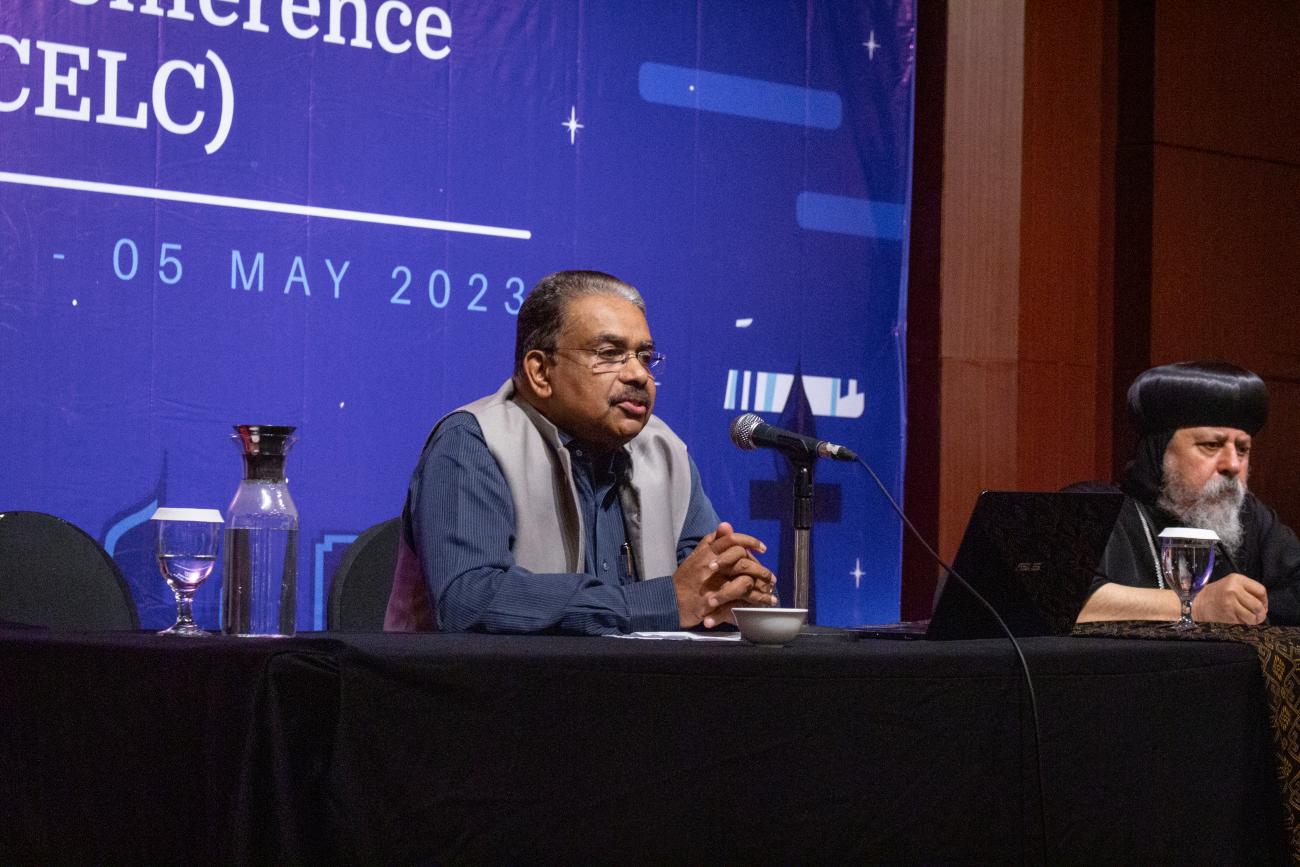“Participation in struggle for social justice and advocacy is prophetic diakonia,” says CCA General Secretary

Dr Mathews George Chunakara (CCA) speaks on 'Ecumenical Diakonia: The Ecclesial Action for all God's People and all Creation'; moderated by HG Anba Daniel (Bishop of the Diocese of Sydney & Affiliated Regions, Coptic Orthodox Church)
Jakarta, Indonesia: The second part of the Asian Church and Ecumenical Leaders’ Conference (ACELC) began with the thematic presentation by Dr Mathews George Chunakara, the CCA General Secretary, on the topic ‘Ecumenical Diakonia: Ecclesial Action for all God’s People and all Creation’.
Organised by the Christian Conference of Asia (CCA) in collaboration with the World Council of Churches, the ACELC entered into discussions on the practical application of authentic diakonia which will serve the entire household of God.
“Diakonia is a permanent activity of the church and is as important as worship and witness. Today, we see contexts of weaponization of diakonia as a means of dominance and dependence, to create spheres of influence as well as to demonstrate the superiority of the giver. A truly authentic diakonia, which involves more than the giving of money, goods, and services, and more than the sharing of resources or personnel, needs to be evolved. Diakonia demands taking upon oneself the suffering of others. Participation in the struggle for social justice and echoing the prophetic voice must be part of the church’s diaconal mission,” said Dr Mathews George Chunakara.
The CCA General Secretary narrated the metamorphosis of the concept of diakonia; from its narrow understanding of charity, or following a practice of giving and receiving, to sharing and pooling of resources together as well as extending support to mega development projects with back donors’ funding. He also said that ecumenical diakonia should not have a ‘hit-and-run’ approach or a one-off project but entails continuing accompaniment, solidarity, and advocacy, in which churches can play important roles through local congregations who are engaged in diakonia.
“What we lack now is an authentic diakonia which demands a willingness to suffer with those whom one serves and to give of oneself, as well as a culture that does not promote diakonia as an occasion for domination, privilege, and rank. Diakonia should involve more than the giving of money or goods and services and more than the mere sharing of resources or personnel,” said Dr Chunakara to a representative group of church and ecumenical leaders from Asia gathered in the Indonesian capital of Jakarta.
Rev. Matthew Ross, Programme Executive for Diakonia and Capacity-building with the World Council of Churches (WCC), delivered a presentation on ‘Ecumenical Diakonia: Called to Transformation’ which primarily focused on the 2022 WCC publication of the same name.
“Diakonia is church-related social care—an integral part of Christian service which we in faith are called to do. Faith is our response to God’s grace; so, sustained by worship, prayer, and the Word of God, we are called to live out God’s grace and love in loving neighbour as self. Yet, we cannot do this alone. We need to work in collaboration with our Christian sisters and brothers. In working together, we increase our capacity and maximise the benefits for those who need them most. Hence, ecumenical diakonia,” said Rev. Ross.
He further added that diakonia must be inclusive—not merely doing acts of kindness to others from a position of wealth or privilege, but recognising that human beings are equal in God’s sight, and that diaconal service must involve and engage the users rather than treating them as passive recipients from whom gratitude is anticipated.
Comments and questions were invited from the floor. Responses touched on the following matters: the danger of power imbalances in bilateral diakonia and the preference for multilateral diakonia, the use of the United Nations’ Sustainable Development Goals (SDGs) as a framework to provide direction for diakonia, the inherent risks and challenges of the ‘prophetic’ nature of diakonia such as the accusations of forced conversion or proselytism, and the expansion of diakonia for interreligious cooperation in Asia’s pluralistic contexts.
Over 100 Asian church and ecumenical leaders are attending the ACELC being held from 1 to 5 May 2023.










